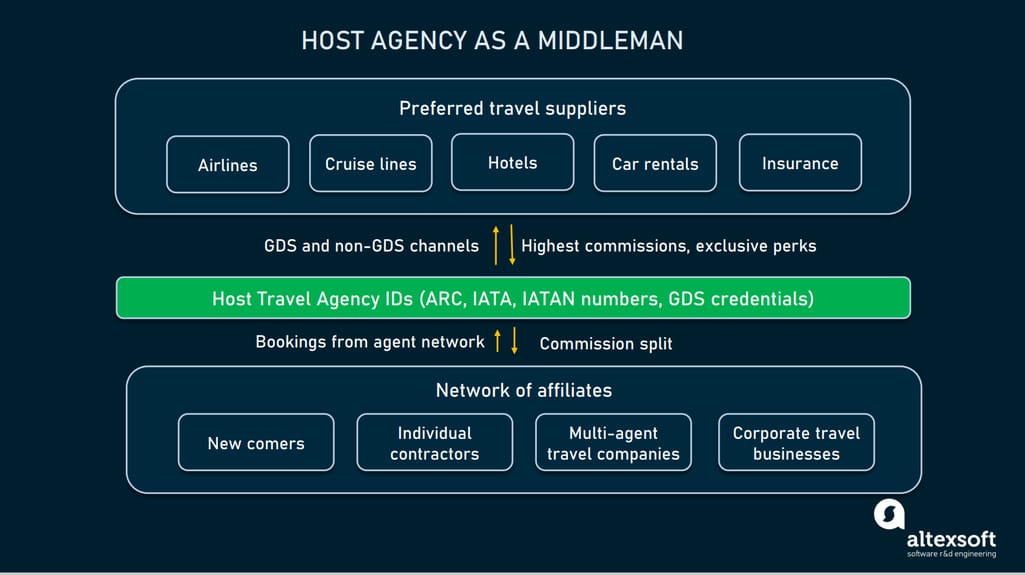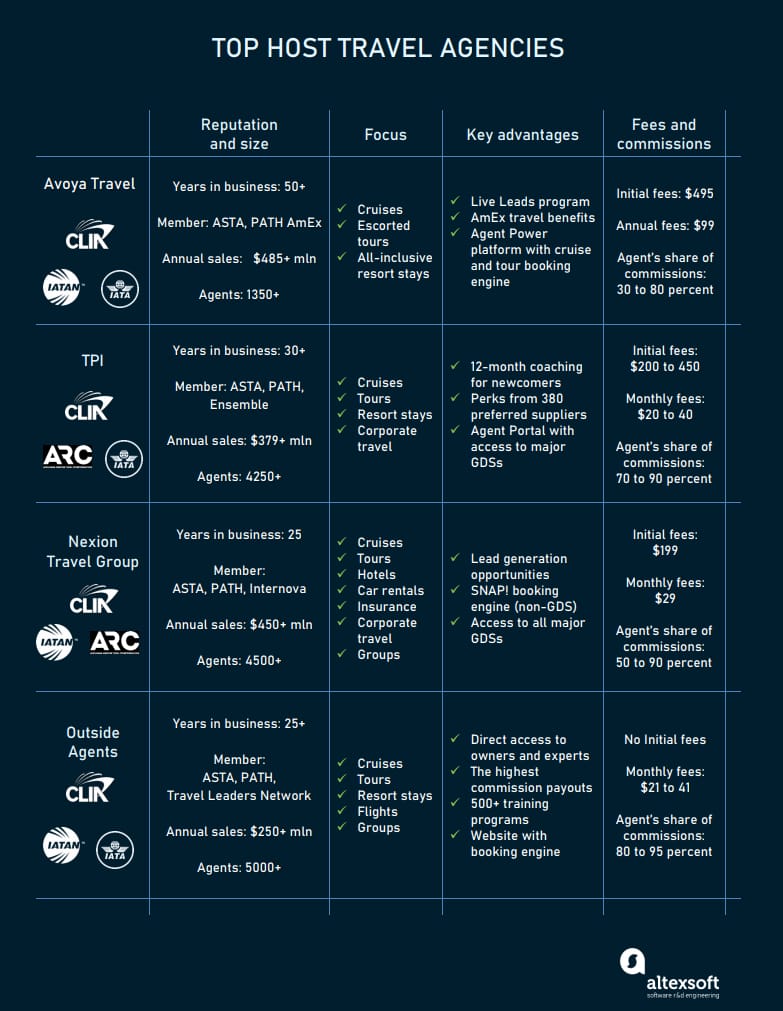In 2020, the travel industry found itself among the sectors hardest hit by COVID-19. The American Society of Travel Advisors (ASTA) reported a 75-percent cut in revenue across travel agencies compared to 2019.
Now, businesses face a long road to recovery. Being most vulnerable to the consequences of the crisis, small companies need additional support and cost-reduction opportunities. Many of them choose to seek help from host agencies ,which proved to be a wise move even in better times.
This article explains how host agencies work, what benefits they offer to travel professionals, and how to choose the right fit out of endless options.
What is a host travel agency?
A host travel agency is a company that supports the professional requirements of home-based travel agencies, individual contractor (IC) agents, and new entrants. Optionally, they even may serve the needs of corporate travel. Roughly, hosts act as middlemen between the network of travel retailers, often with no experience, and travel suppliers.
“A host travel agency is an accelerator,” explains Ernesto Sigg Rodríguez, Chief Commercial Officer at Fitbooktravel, that provides technology consulting services for online travel businesses. “As a travel agent you want to run your business, but you need resources that you can't afford alone. An HTA will give you these resources until you get enough traction to fly alone.”
Host travel agency business model
All agents belonging to a particular host use the same accreditation numbers or IDs to book travel. That way, suppliers see the entire group as one reputable client rather than a band of newbies with low sales volumes.
This model allows companies on a tight budget to skip the time-consuming and costly procedures of acquiring necessary credentials. Besides, they get access to better deals and higher commission levels available for wholesalers or corporate clients only. In return, a host splits commissions with the agent and charges a fixed fee (monthly or annually) for its services.
Host travel agency accreditations and memberships
What accreditations does an agency need to be identified as a travel professional? While there are numerous options, hosts typically work with the three most accepted and important IDs.
IATA/IATAN numeric code. Accreditation from the International Air Transport Association (IATA) or its US-based division, the International Airlines Travel Agent Network (IATAN) authorizes issuing air tickets on behalf of airlines. It also serves as a sign of professionalism for travel advisors and other industry players.
ARC Agency Code Number. The Airlines Reporting Corporation or ARC works only with US travel agents. It enables them to sell airline tickets and handles financial transactions between carriers and retailers.
In fact, ARC and IATAN duplicate each other, so ARC-affiliated companies don’t need IATAN credentials. However, many American agencies prefer to have both, as IATAN is associated with worldwide professional recognition and its members can enjoy significant travel discounts.
CLIA Agency Membership. A travel agency may book cruises, no matter the type of professional accreditation it has. However, the Cruise Lines International Association is the only organization that offers a cruise-focused certification program. CLIA members have a strong reputation as cruise sellers and take advantage of exclusive perks and discounts.
Each of these memberships requires significant fees, a large volume of sales, and proven experience in business. With a host agency, a small company can get all credentials immediately at a low price.
Services provided by host travel agencies besides accreditation
Sure enough, the use of an accreditation number is a major part of any host agency offering, which makes this scenario viable and win-win. As we mentioned before, working under the host umbrella guarantees low start-up costs, higher commissions and no hassles with getting and staying certified.
But most host agencies have something more to offer to their agent network. The assortment of services differs from agency to agency, depending on the needs of target clients. However, the most common list includes the following opportunities.
Education and training
Almost all host agencies provide different types of training programs to both newbies and those already familiar with the travel business. New agents acquire general business knowledge and industry-specific information — like which supplier serves a particular destination.
For experienced contractors, large host agencies offer continuing education, updates from suppliers, conferences, meetups, and more.
Bookkeeping and sales tracking
Often, a host agency takes the role of a part-time bookkeeper, managing commissions and taxes. An agent receives reports to track money earned and monitor business performance. Once a year, a host sends its clients a 1099 tax form.
Errors and Omissions (E&O) insurance
Errors and Omissions or E&O insurance is not something specific to the travel industry. It protects any service business from the costs of lawsuits brought for professional mistakes. It covers legal defense, court and administrative costs, settlements and judgments.
Does any travel agency need such protection? Yes, since everybody makes errors and their consequences may be wallet-busting. Many host agencies offer contractors to join their insurance policy rather than obtain a separate policy. Of course, this insurance policy only applies to bookings made under the host’s accreditation number.
Marketing programs and sales opportunities
The biggest challenge newbies face is promoting their services. That’s why travel hosts typically arrange marketing programs for travel agencies. These programs embrace training, courses, marketing materials and technologies to build a business. Also, large suppliers often use host agencies to promote their products, and small agents can take great advantage of these partner programs.
Lead generation
Some big host agencies advertise their lead generation programs. Typically, they provide a technology that automatically matches affiliated agents to consumer requests based on niche, expertise, and other metrics. This way agents can get new clients and earn higher incomes.
Technology solutions
To run a travel business you need a variety of digital tools. And host agencies do their best to equip their agents with necessary programs. The software package may include
- CRM system,
- accounting software,
- email and social media marketing software,
- a lead generation engine,
- booking tools, and
- a consumer-faced website.
So, that’s what host agencies usually do: provide its affiliates with all necessary credentials, expertise, resources, support, and technologies to run a travel business. Does it mean that the first host you come across will perfectly cover your needs? Of course not.
When digging into details, it appears that host agencies differ in many ways from sales volume and a niche they focus on to the share of commissions offered. Which leads us to the next question: How do you select the right option?
Click here to learn more about types of travel agency software.
How to choose a host travel agency
Though applying the same business model, all host agencies are not the same. And it takes time to find the one fitting your expectations. Here are recommendations that will help you narrow down your choices.
Opt for the most experienced partner you can find — especially if you are just entering the travel business. The newer the host, the less knowledge and fewer valuable contacts it has. Also, small host agencies usually acquire fewer benefits from suppliers due to a modest volume of sales. So, medium (100+ agents) and large (500 + agents) hosts with a long history are a safer choice. Only the rarest exceptions prove this rule.
Select a host agency among members of reputable associations — like the American Society of Travel Advisors (ASTA) or the Professional Association of Travel Hosts (PATH). To join these organizations, a company must meet a number of requirements. This guarantees competence and adherence to a strict code of ethics.
Check if a host belongs to any consortium. In travel, a consortium is a network of independent agencies that team up to enhance buying power and commission rates. A company must reach a certain sales volume to join the club, so this option is not available for small businesses. If your potential host is a member of consortia like Virtuoso, Signature Travel Network or Ensemble Travel Group, you’ll automatically get access to all exclusive amenities.
Identify the level of support to look for. New entrants and seasoned agents need quite different levels of support from a host agency. While the former require much training and mentoring, the latter may mainly seek the highest payouts and benefits from large suppliers.
Look through the list of preferred suppliers — or airlines, cruise lines, hotel chains, tour operators, and other vendors a host agency partners with. These suppliers offer the most attractive commission rates and other perks in return for high sales driven by a network of agents. Check out whether the list is relevant to what you are going to sell. If not, even the best negotiated deals won’t do you any good.
Don’t be lured by high commissions. For every booking, the vendor pays negotiated commissions to the host and the host, in turn, passes on a part of this money to you. The split typically ranges from 10/90 to 30/70 percent with the host keeping the smaller portion. If the percentage offered to agents nears 100 percent, probably, it comes at the expense of the support level. Or you will be charged higher fixed fees (annually or monthly) for services provided.
Pay attention to the technology stack. Software provided by a host agency could save a lot of headaches. The two most important solutions to сhase up are an out-of-the-box consumer website (if you still don’t have one) or a website-building tool and a user-friendly booking platform. The latter enables you to buy travel from global distribution systems (GDSs) even if you haven’t been trained to do it. In the absence of such a middleware platform, you must take courses on working directly with GDS terminals.
“In summary, when choosing a host agency, you should balance know-how — or all the support you’ll need in terms of back-office processes, sales, and marketing — and technology tools. Making a new booking, creating an itinerary or issuing an invoice, shouldn't take ages,” — Ernesto Sigg Rodríguez advises.
Below, we’ll review the top host agencies to see how they leverage expertise and technologies and why exactly they are preferred by thousands of travel agents.
Top host travel agency review
According to FindaHostTravelAgency.com, the platform matching travel professionals with hosts based on 16 filters, the top recommended host agencies in 2020 are:

Top host travel agencies comparison
We’ll take a quick peek at what they offer and how each of them stands out from the other hosts.
Avoya Travel: AmEx representative with focus on technologies and lead generation
Available services
- educational programs
- a consumer-facing website
- lead generation
- a CRM system
- marketing tools
- commission tracking and performance reports
- a cruise and tour booking engine
Not offered
- E&O insurance
- large variety of air and hotel booking options
Avoya Travel is one of the largest leisure travel sellers with more than 50 years of history. Not specially focusing on air, car, and hotel products, the company offers them mostly as a part of their cruise, tour, and resort vacation packages.
Avoya heavily invests in new technologies, providing its affiliates with a consumer website and Agent Power platform that combines a CRM system, marketing tools, a dashboard with charts and reports on performance metrics, and a booking engine. It connects directly to suppliers’ systems, but in some cases the platform links to Sabre GDS via an API.
The key feature of Avoya is its lead generation program called Live Leads and designed to send new clients directly to affiliates 24/7. Keep in mind, though, that when you take a lead from Avoya, the host takes a larger part of the commission (70 percent) and you receive only 30 percent.
As an American Express travel representative, the company offers all AmEx exclusive benefits. Agents may earn Membership Rewards Points and use the Pay with Points option to buy hotel reservations, cruises, and more.
Travel Planners International: exclusive support for newcomers
Available services
- educational programs
- E&O insurance
- CRM system
- marketing tools
- accounting software
- booking engine connected to all major GDSs
Not offered
- lead generation
- consumer-facing website
TPI positions itself as a marketing and support agency for new and experienced travel professionals. It is proud of the fact that over 40 percent of their affiliates joined the host when they were novices. For the first 12 months, the special Agent Engagement Department takes care of newcomers, counseling them on any question. TPI doesn’t offer live leads — instead, it focuses on training and marketing programs so that agents can more easily find customers themselves.
A member of the Ensemble Travel Group, TPI gives access to high-tier commissions, perks, promos, and advertising goods from 380 preferred suppliers. The affiliates log into the Agent Portal with all marketing materials, email and accounting software, and a booking tool, enabling them to work with Amadeus, Sabre, and Travelport GDSs. The Agent Portal provided by Ensemble is integrated with the CRM back office system, launched by TPI.
Nexion Travel Group: one-stop-shop for leisure and corporate travel professionals
Available services
- educational programs
- consumer-facing website
- lead generation
- marketing tools
- sales and commission tracking
- non-GDS booking engine
- access to major GDSs
Not offered
- E&O insurance
Nexion Travel Group is a part of Internova Travel Group (ex-Travel Leaders Group), a global network representing over 65,000 travel agents. This affiliation results in a wide selection of travel offers and top-tier commissions from car, hotel, flight, cruise, and insurance suppliers.
Nexion has different membership plans for newcomers, experienced professionals, multi-agent companies, and corporate travel businesses. All the members get a free consumer-facing website, a range of administrative and reporting tools, and access to the non-GDS booking engine called SNAP! Agents can also use the host’s credentials to shop travel products via Amadeus, Sabre, Apollo, and Worldspan.
Outside Agents: family atmosphere and the biggest possible commission share
Available services
- educational programs
- E&O insurance
- consumer-facing website
- CRM system
- groups promotion tool
- booking engine for cruise and air
Not offered
- lead generation
A family-owned business, Outside Agents give their members direct access to owners and travel experts who provide one-on-one guidance and support. This personal approach sets the company apart from its rivals. Besides, the host charges no start-up fees and returns to agents up to 95 percent of commissions earned.
The Agent Portal offered by the host includes live chats with the agent community, a knowledge base of more than 500 trainings, and access to travel suppliers. It also provides a prebuilt customizable website with an integrated booking engine for cruise and air tickets. Other technologies designed for agents are a client management platform and groups promotion tool to facilitate group trips.
From multiple choices to one possible option
Nine times out of ten, travel agents change hosts several times before finding the suitable company to stay with it for years and even decades. Anyway, the most important part of the selection process is understanding your requirements. Once you clearly identify them, it will be much easier to boil down endless options to just a few and finally to the only possible candidate.

